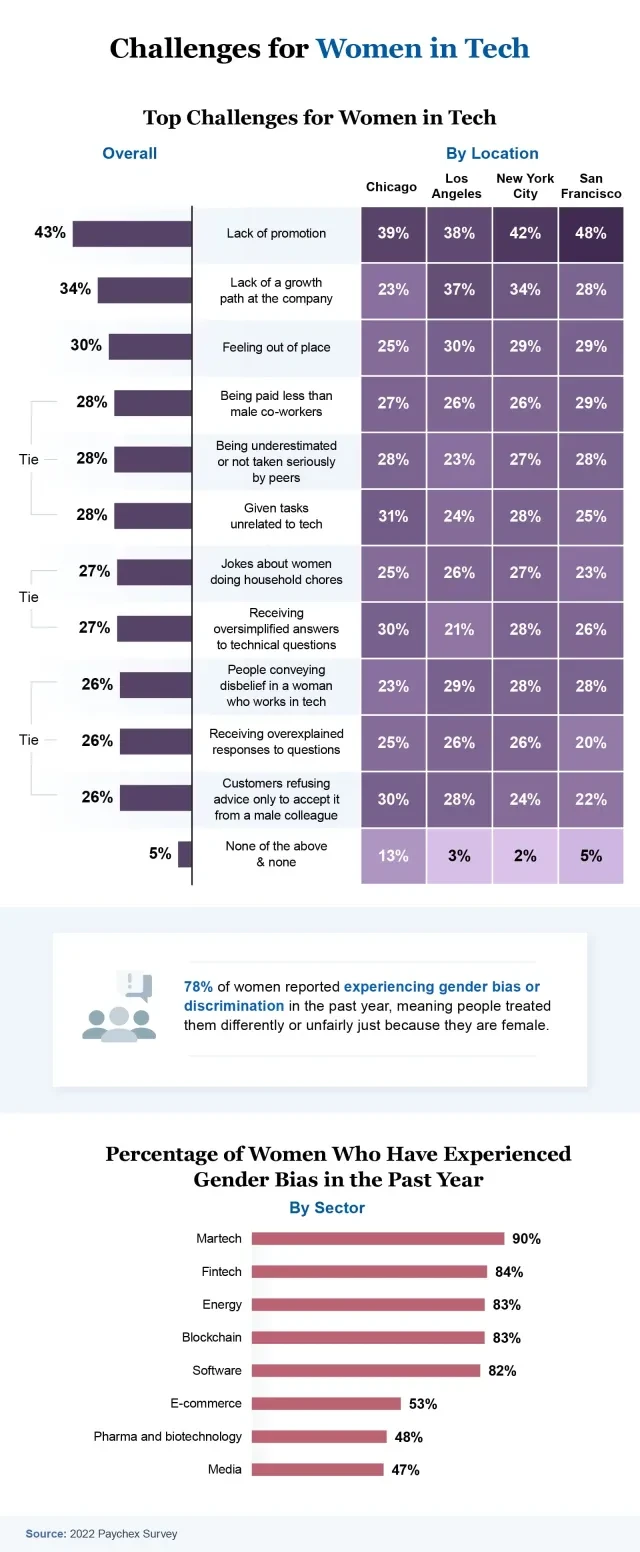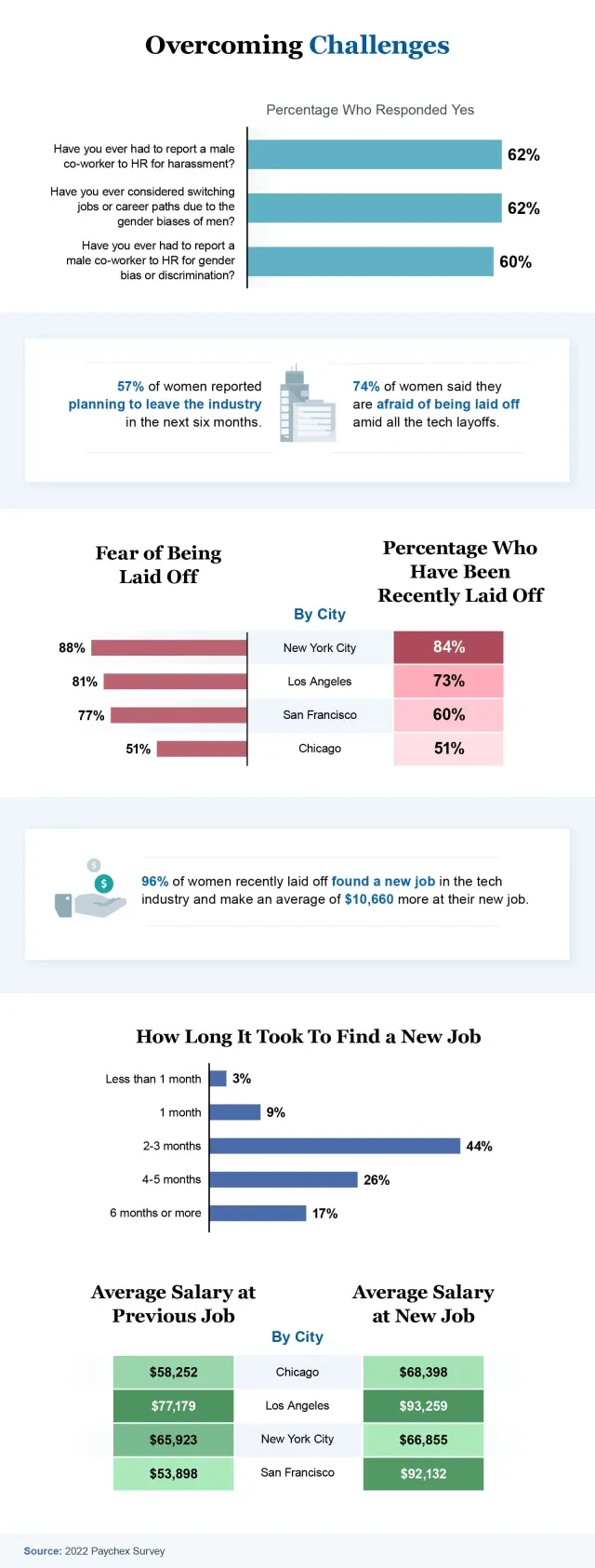Key Takeaways
- 78% of women have experienced gender bias or discrimination in the past year.
- 62% of women have reported a male co-worker to HR for harassment.
- 74% of women are afraid of being laid off amid all the tech layoffs.
Understanding the Tech Environment for Women
Although there are many women in the technology industry today, they have been historically underrepresented in the field. In 2018, we analyzed the climate for women in tech to better understand the problems they faced. But how have things changed in the last four years? To find out, we decided to do it again in 2022.
We wanted to know if women still face the same challenges as before, so we dug into their education, current jobs, and reasons for entering their respective tech fields. As the country recovers from the pandemic and faces a potential recession, we also wanted to understand how women were affected by recent layoffs. To do so, surveyed 1,000 American women in the technology industry. Here's what they had to say.
Getting Started in Tech
With so many barriers to entry for women in the technology industry, including a lack of support for women pursuing education in STEM, we first wanted to know what their reasons were for choosing a career in tech.
Despite the stigma women might face for pursuing technology-related careers, an interest in or passion for computers and technology was the top reason survey respondents entered the industry (25%). This finding is similar to the top motivator in our 2018 survey: a love for computers and tech. Almost as many women (23%) said job stability was their main reason for joining the industry in 2022.
Considering tech positions are in high demand, it makes sense that so many women would see the job market as stable. But the benefits and salaries are another matter, with only 5% of women citing competitive pay as the biggest draw for female tech workers. Of course, this varies based on location — for example, 18% of those who named pay as their primary reasoning in 2022 were in New York City. And in 2018, California Bay Area women were three times as likely to cite high pay than those living in other places. The importance of high earnings in areas with high living costs hasn't changed much.
Having a tech-related degree may seem like an obvious motivation to seek a career in tech, but only 11% claimed this as their top reason for working in the industry. While the degrees earned by most women we surveyed (over 60%) were in information technology (IT), many other respondents' tech skills were self-taught. Among them, the most common professional position was data analyst, while for those with a tech degree, it was software developer.
Women's Struggles in the Tech Industry
Although women get into the tech industry for many different reasons, many have something in common: the challenges they experience in the workplace. Next, we asked women about their experiences and feelings about being a woman working in a tech field.
The challenge most commonly faced by women in the tech industry was a lack of promotion, as cited by 43% of respondents. With no way to move up in the ranks, 34% felt like there was also a lack of a growth path for them within their company. Feeling like an outsider was also prevalent, with nearly a third saying they've felt out of place at work.
A few years ago, being underestimated or not taken seriously by peers was the greatest opposition women faced — 67% of respondents reported this in 2018. Although this issue still landed among the top five most common challenges in 2022, there has been a significant decrease: Only 28% of women said their peers underestimated them or didn't take them seriously.
The prevalence of issues like these varied depending on geographic location. In San Francisco, women felt the wage gap more, with 29% of women saying they weren't paid as much as their male co-workers. And at 37% in Los Angeles, women felt the lack of growth opportunities more than those in any other city.
Think our modern era is the picture of gender equality? Think again. More than 1 in 4 of the women we surveyed said they've heard jokes in the office about women doing household chores. And the prejudice wasn't limited to the workplace: 78% reported experiencing gender bias or discrimination in the past year, whether in their personal or work lives.
Gender-based workplace discrimination varied by tech sector. For instance, nearly all women in the marketing technology sector (martech) have experienced gender bias (90%). More than 80% of those working in financial technology, energy, blockchain, and software have as well. The lowest instances of gender discrimination were reported by women in media-related tech jobs, but it was still reported by nearly half (47%).
Coping With and Overcoming Inequalities
As more women enter the tech workforce and are honest about the challenges they face, the more they can work together to overcome discrimination and bias in the workplace. To conclude our survey, we asked women about steps they've taken to protect themselves or their colleagues at work. They also shared their career outlooks.
Many women have had to take action against inappropriate behavior in the workplace: 62% said they reported a male co-worker to HR for harassment and 60% for gender bias. Women seem to be reporting these incidents more frequently now than in 2018 when only 19% of our survey respondents reported co-workers for bias or discrimination, and 21% spoke up about harassment.
The burden of bias against women in the tech industry is heavy enough to make many want to change careers (62%). Many we surveyed were even planning to act on it soon: 57% said they plan to leave the industry in the next six months. This shows an increase from the 2018 average when only 24% of women said they had considered changing fields for this reason.
The threat of layoffs and the anticipation of a recession have compounded these problems for women in tech. Even giant tech company Meta recently let much of their staff go in a push to reduce costs. Nearly three-quarters of our respondents (74%) said they were afraid of being laid off. Many of them already had, with 84% of respondents from New York City saying they had been laid off recently.
But of women who had recently been let go, 96% went on to another tech industry job where they made even more than they had previously: an average increase of $10,660. We saw even bigger increases in some places, especially San Francisco, where they earned over $38K more on average at their new job. Most women said it took between two and five months to find a new job, but it was worth the wait.
Moving Forward
Women in the technology industry still face a myriad of challenges in the workplace, from lesser pay to being undervalued and even harassment. But by far, their biggest challenges were a lack of growth potential at their workplaces and worries about potential layoffs. However, fewer cited workplace challenges in 2022 compared to 2018, and they have since been more likely to report co-workers for gender bias, discrimination, or harassment.
Still more, though, are considering leaving it due to gender-based pressures, pointing to a need for further support. Tech companies must do more to bridge these gaps for women in the workplace and give them the same opportunities and respect as their male counterparts.
Methodology
Paychex surveyed 1,000 American women in the technology sector about their experiences. The average age was 32, and their locations were as follows: 42% lived in New York City, 12% in Los Angeles, 7% in San Francisco, 7% in Chicago, and 32% in other U.S. cities.
About Paychex
Paychex provides payroll, human resources, and benefits outsourcing services for small to medium-sized businesses. Our tools make hiring, managing, and retaining employees easy.
Fair Use Statement
If you enjoyed our findings, feel free to share them for noncommercial purposes. Please be sure to link back to our original article as a credit to our Paychex research team.












